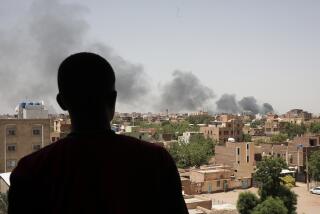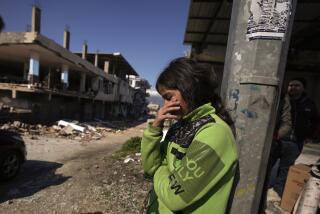U.S. Relief Worker in Chechnya Goes Missing : Russia: His foundation issues appeal for help. Two American envoys to join search for the aid specialist.
- Share via
MOSCOW — The president of the Soros Foundation appealed for help Friday in finding a well-known American disaster relief worker who has disappeared in Chechnya and is feared dead or held captive.
Frederick C. Cuny, a 50-year-old specialist in disaster relief who has worked in more than 30 war zones from Biafra to Bosnia, has not been heard from directly since March 31. A message from companions was received April 9.
Friends and colleagues have been searching for the Texan since he failed to resurface in time to deliver a speech at Camp Pendleton near Oceanside, Calif., on April 8.
Cuny had been advising the Soros Foundation on how best to help victims of the war in Chechnya.
The State Department, reversing its earlier position that the Russian government could handle the search alone, said it is dispatching two people from the U.S. Embassy in Moscow to Chechnya this weekend to help look for Cuny.
The search for Cuny came amid signs that the Russian officials may be seeking a way to halt hostilities in Chechnya before May 9, when world leaders who are growing increasingly anxious over the brutality of the 4 1/2-month-old war are scheduled to visit Moscow to commemorate the 50th anniversary of the Allied victory over Nazi Germany.
In a written message read on Chechen television, Russian Prime Minister Viktor S. Chernomyrdin announced Friday that Russia is ready to negotiate with Chechen field commanders with no preconditions.
However, at least two previous peace efforts by Chernomyrdin have quickly been torpedoed by hard-liners close to President Boris N. Yeltsin, and previous Kremlin offers of unconditional peace talks have turned out to carry a whopping prerequisite: that Chechen fighters lay down their weapons and concede that Chechnya is part of Russia.
The rebels have categorically rejected both demands, insisting that Russian troops must be withdrawn from Chechnya before they will disarm.
It was unclear Friday whether the new Chernomyrdin offer was a real attempt to make peace or more window-dressing to justify Moscow’s stepped-up campaign to crush the remaining Chechen opposition.
The independent NTV television station reported that Moscow wants May 9 to pass quietly in Chechnya, so Russian military commanders, who had previously warned that rebel forces were taking advantage of the cease-fire to rearm, have kept silent.
Over the last month, Russia has launched an all-out offensive, using bombing, shelling and alleged massacres of civilians to drive the last rebels out of the flatlands of Chechnya.
The military operation has proven slower and more difficult than expected.
*
On Wednesday, Russian commanders declared that they had ousted the last Chechen fighters from the southwestern village of Bamut by dropping depth charges into the nuclear-proof bunkers where the rebels were hiding. But the next day, Russian soldiers had to retreat without taking Bamut because of heavy Chechen shelling from the surrounding mountains, and commanders said it may take up to another week to capture the town.
Cuny probably passed through Bamut on his way to eastern Chechnya, Soros Foundation President Aryeh Neier told a news conference in Moscow on Friday.
Neier said the only reports he has received have been second- and third-hand, contradictory and unconfirmed.
Some reports alleged that Cuny was being held prisoner by Chechen forces, others that he was a Russian captive. But Neier said he had no reliable news of Cuny, his translator or the two Russian doctors who disappeared along with them.
The doctors were working out of a special hospital the Soros Foundation had set up just over Chechnya’s western borders, but traveled into the war-torn republic to treat the wounded there, Neier said.
Cuny and his translator were traveling with them, according to radio messages the doctors sent, the last one on April 9.
Their car was found parked in Bamut, but it was unclear whether they had been forced out of it or voluntarily abandoned it for sturdier transportation to go deeper into the muddy combat zone, Neier said.
Cuny is best known for his work in Bosnia-Herzegovina, where together with the International Rescue Committee he helped resupply heat, electricity, water and even vegetable seeds to the besieged city of Sarajevo.
He worked on the Red Cross’ Biafra airlift in 1969, worked on refugee and human rights issues in Kuwait and northern Iraq during and after the Persian Gulf War and was a U.S. government adviser during the famine in Somalia.
Neier described Cuny as “a mountain of a man” who could not possibly have escaped notice wherever he went in Chechnya. At 6-feet-4 and 250 pounds, and last seen wearing cowboy boots, the Texan would probably have attracted attention from both Russians and Chechens.
*
The Russian counterintelligence service has publicly accused the Soros Foundation, the brainchild of Hungarian-born philanthropist George Soros, of espionage, calling its gift of $100 million to support impoverished Russian scientists merely a cover.
The Russian Science Ministry apologized to Soros, but the intelligence agency never retracted the charge. Cuny was employed as a Soros consultant.
Meanwhile, some Chechens allege that the Russian Red Cross and other humanitarian aid groups have been infiltrated by Russia’s security services, and that Russian and U.S. spies have been posing as Western journalists and aid workers.
At least six journalists, including an American photographer, have been killed covering the war in Chechnya, but Cuny is the first Western aid worker to vanish.
Two Russian journalists have been missing since Feb. 27.
The Soros Foundation asked the U.S. Embassy for help locating Cuny on April 9.
It also asked the Pentagon and the FBI to forward the request to their Russian contacts. Neier said Russian officials contacted in Moscow were well-briefed and helpful.
But the U.S. request for assistance evidently has not been registered at the highest levels.
The commander of the Russian operation in Chechnya, Interior Ministry Col. Gen. Anatoly S. Kulikov, in a meeting with reporters in Moscow on Wednesday, looked blank when asked about Cuny.
More to Read
Sign up for Essential California
The most important California stories and recommendations in your inbox every morning.
You may occasionally receive promotional content from the Los Angeles Times.










